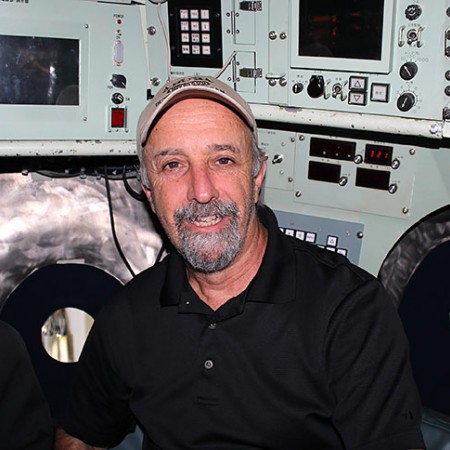
Professional Preparation
University of Texas at Dallas - 1997
University of Texas at Dallas - 1993
Universidad Nacional de la Patagonia, Comodoro Rivadavia, Argentina - 1985
Research Areas
Research Interests
In 1997, I began to lecture at UTD teaching The Oceans, a self-paced interdisciplinary science course. Over the last several years I have been teaching a number of lower- and upper-level undergraduate courses, first as a Teaching Assistant, and then as a Lecturer fully responsible for lectures and labs. Currently, I am involved in the following courses: Oceanography, Paleontology, Earthquakes and Volcanoes, GRELA and Physical and Historical Geology. Online course development, Implementation and teaching. Increasing student enrolment from 173 to 520 students in one year, It involved three courses up to Fall 2010: The Oceans , Earthquakes and Volcanoes and Physical Geology.
Main interest: Stratigraphy, biostratigraphy, and micropaleontology as working tool. Presently I’m working in Mesozoic microfossils, particularly Radiolaria. This group of microfossils intensively studied only in the past thirty years; need to be calibrated to the classic ammonite zones defining the Jurassic- Cretaceous stratigraphy.
The research has been extended to the subsurface of the North GOM (Louisiana) where a well preserved fauna of Radiolaria from the deepest part of the Basin shows good potential as a subsurface tool. I am extending the research to other related Mesozoic basins, including the whole Gulf of Mexico in the border with Texas and south Central area. Industry interest on the research is high.
I’m also working on active research on the Mariana Forearc system sampling with submersible and mapping, on areas currently poorly known. As always I involve undergraduate students in the process of research. Participating on the Yokosuka” Voyage No. YK 10 - 12 September – October 2010: Participant in Shinkai 6500 diving in the Mariana forearc. Dive #1232, 6,332 meters. October 2010. Currently analyzing sediment and biostratigraphic samples.
Publications
Appointments
Department of Geosciences UTD [2022–Present]
The University of Texas at Dallas [2019–2022]
The University of Texas at Dallas [1998–2019]
Dallas Community College [1997–1998]
The University of Texas at Dallas [1996–1997]
Universidad Nacional de la Patagonia, Comodoro Rivadavia, Argentina [1994–1995]
Universidad Nacional de la Patagonia, Comodoro Rivadavia, Argentina [1987–1993]
Consultant on Oil and water reservoir studies, basin analysis and paleogeographic studies in the South of Argentina, Chile, Nevada, and Mexico for the following companies: YPF, Indus, Compaia Minera, Union Pacific Petroleum, Astra Oil Company (Argentina [2018–2018]
Projects
Magmatic and Mechanical Extension of the Challenger Deep Forearc Segment: Insights into Subduction Initiation
2022/10–2022/07 The sinking of oceanic lithosphere in subduction zones drives the fundamental Earth process of plate tectonics. To understand plate tectonics, it is important to understand how new subduction zones form. This project will study a new example of subduction initiation in the Western Pacific near the Challenger Deep and Guam USA using a research vessel and a tethered remotely-operated vehicle (ROV) capable of working down to 3 miles deep. Investigators will study 9 sites during a 23-day expedition. Collected samples will be subjected to several laboratory tests. The team of young and senior geoscientists will provide important training of new marine geoscientists and an unusually strong internet connectivity will allow a handicapped geoscientist to participate in expeditionary science. How new subduction zones form is a key topic of geoscientific research that requires identifying and studying active examples. Investigators in this study will conduct a novel interdisciplinary marine geologic study of a newly recognized active example of subduction initiation in the Western Pacific. They will study the Challenger Deep Forearc Segment (CDFS) located in the inner trench wall of the Mariana Trench SW of Guam. ROV Jason/Medea will be used to study 9 sites distributed along 220 km of the CDFS above 6500m water depth. his award reflects NSF's statutory mission and has been deemed worthy of support through evaluation using the Foundation's intellectual merit and broader impacts review criteria.Jurassic Radiolaria in the subsurface of the northern Gulf of Mexico, Haynesville Formation, North Louisiana
2009/05–2020/11 Pujana, I., N. Shaw, Jr., and P. F. DuBois.Gulf Coast Association of Geological Societies Transactions, v. 59, p. 637. 2009. Second Place, Gordon I. Atwater Best Poster Award, Gulf Coast Association of Geological Societies, 2009, Presented at the 2010 Annual Convention October 10-12, San Antonio, TexasOccurrence of Vallupinae (Radiolaria) in Neuquen Basin: Biostratigraphic implications.
1994/03–1994/12 Pujana, I.,1994, 4th International Congress on Jurassic Stratigraphy and Geology. Mendoza.Developing a new undergraduate science course focused on Hispanic students at the University of Texas at Dallas; geography, resources, and environment of Latin America.
2004/02–2004/11 Pujana, I., Stern, R.J. and Ledbetter, C., 2004a. Abstracts with Programs - Geological Society of America.Investigation Of Middle And Lower Jurassic Radiolaria From The Neuquen Basin Of West-Central Argentina.
1998/08–1998/12 Pujana, I. Abstract present to the Third Annual Conference of South Atlantic Mesozoic Correlations. I.G.C.P.Additional Information
REVIEWS FOR FOUNDATIONS
- Course Curriculum and Laboratory Improvement (CCLI) program, Adaptation and Implementation Track (A&I), NSF, Arlington, Virginia, January 2005.
- Division of Earth Sciences, Instrumentation and Facilities Program for the NSF-wide Major Research Instrumentation Program (MRI), 2001, 2002 and 2003
- National Science Foundation Course, Curriculum, and Laboratory Improvement (NSF-CCLI) "Invention and Impact: Building Excellence in Undergraduate STEM Education," April 16-18, 2004, at the Hyatt Regency Crystal City in Arlington, Virginia. Invited
News Articles
Researchers Explore Pacific’s Most Extreme Depths
Two UT Dallas geoscientists ventured far below the Pacific Ocean surface this week to conduct research in some of the deepest waters on Earth.Dr. Ignacio Pujana and Julia Ribeiro were part of a U.S.-Japanese team of scientists aboard the research vessel Yokosuka.
Activities
Meeting Moderator
Meeting Moderator SWS-AAPG 2010: Shale Gas Geology Session May 15-18Codirector
Micro-Imaging Labhttps://www.utdallas.edu/microimaging/